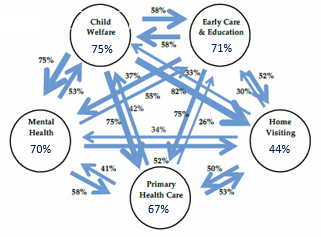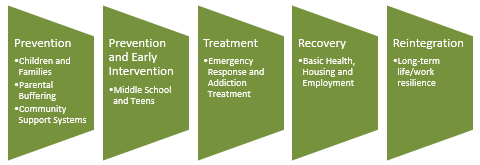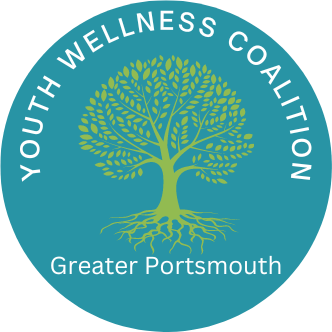Communities that have been most effective in addressing issues resulting from ACEs have created methods that connect the efforts of the full range of community services. As a study in Maine illustrated, there is a 50% to 75% overlap among agencies of the people they are serving. But individuals needing help often have difficulty navigating the pathways between services. Agencies, too, can find it difficult to coordinate their services with each other.
Pinetree Institute facilitates collaboration across community sectors to assist them in dealing with complex issues. Generally, the focus is on one specific area or interconnected areas of concern. In addition to the pandemic, one of the most significant issues communities have been facing in recent year has been the opioid crisis and the related issues around substance use disorder.
Click here for a consultation about how to build a trauma-informed response team in your community.

Measuring Recovery Readiness in Communities
In considering substance use disorder as an example, most effective approaches to addressing these challenges have considered the underlying issues across the full range of contributory solutions from prevention to treatment and re-integration. These approaches are most effective when they adopt a trauma responsive approach that considers the underlying impact of Adverse Childhood Experiences (ACEs) on the individuals who are experiencing personal health challenges.
At Pinetree, we use up-to-date research and national best practices to create a customized set of outcomes that indicate “recovery readiness.” For each community we serve, we adjust these goals based on regional differences and the input of collaborative teams of professionals. From there, we embark on a process of assessment, gap and strength identification, and objective formation. Once our groups have workable, measurable goals, coalition members take on achievable projects and initiatives to better their communities.

“Coordination takes time, and none of the participating organizations has any to spare. The expectation that collaboration can occur without a supporting infrastructure is one of the most frequent reasons why it fails.” - Spark Institute
Our Coalition Work
 Greater Portsmouth Recovery Coalition
Greater Portsmouth Recovery Coalition
Beginning in 2019 as the Portsmouth Coordinated Response to Substance Use Disorder, Pinetree Institute has facilitated the coordination of services in order to more effectively address the growing issues of the substance use crisis in the Greater Portsmouth, NH Area. A group made up of over 70 professionals from public and private sector organizations serving Greater Portsmouth and the Seacoast Area has determined the barriers facing individuals and families impacted by substance use. Our membership spans the continuum of recovery support, broadly focused on the following areas:
- Access to and Coordination of Services
- Co-Occurring Mental Health and Substance Use Disorder
- Harm Reduction and Homelessness
- Recovery Housing
- Workforce Development
This work has been generously supported by Foundation for Seacoast Health, New Hampshire Charitable Foundation, City of Portsmouth, SAMHSA Building Communities of Recovery grants, and private donors
For more information, contact Associate Director Molly Louison-Semrow ([email protected])
 Greater Portsmouth Youth Wellness Coalition
Greater Portsmouth Youth Wellness Coalition
Greater Portsmouth Youth Wellness Coalition (GPYWC) is sponsored by a Drug Free Communities grant. GPYWC involves over 30 members, including youth, parents, and professionals from all sectors across the community. Their monthly in-person meetings, intentional relationship building activities, and dedicated networking opens dialogue, creates connections, and minimizes duplication of efforts. This coalition addresses substance use and mental health challenges among the youth in the Greater Portsmouth region. GPYWC also engages in youth prevention and early intervention programming with a focus on reducing disparities and building positive social and decision-making capacities in youth.
For more information, contact Director of Prevention Programs Amy Michaels ([email protected])
Recovery Ready York County
Recovery Ready York County began work in January of 2024, thanks to generous funding by the Maine Attorney General’s Office. Pinetree had previously facilitated the Kennebunk Area Coordinated Response Initiative in 2020, a group that concluded that meaningful collaboration should include the entirety of York County. This group is comprised of over 30 local agencies committed to assessing gaps and needs in the County and capitalizing on its incredible strengths. Focus areas have been:
- School & Community Prevention
- First Responders, Courts, & Corrections
- Healthcare & Hospitals
- Treatment & Recovery Housing
- Harm Reduction & Mutual Aid
- Workforce Development
This work has been generously supported by the Maine Attorney General’s Office, Kennebunk Savings Bank, Maine Community Foundation, and the Towns of Kennebunk, Kennebunkport, and Arundel.
For more information, contact Associate Director Molly Louison-Semrow ([email protected])
Other Coalition Offerings
Fiscal Sponsorship of Coalitions
Pinetree Institute is the Fiscal Sponsor for the Dover Mental Health Alliance, a community-led group of individuals advocating to reduce stigma and increase resources for mental health in the Dover, NH Area.
Click here to contact us about how Pinetree can act as a fiscal sponsor for your group or initiative.
Coalition Consulting
Pinetree Institute welcomes opportunities to share its experience of coalition-building across a range of communities. We work with community groups of all types and sizes to assess their local needs, recommend measurable metrics and strategies, and build a sustainable framework for collaboration.
Click here if you would like to discuss how Pinetree can help facilitate a coordinated response initiative for your community.